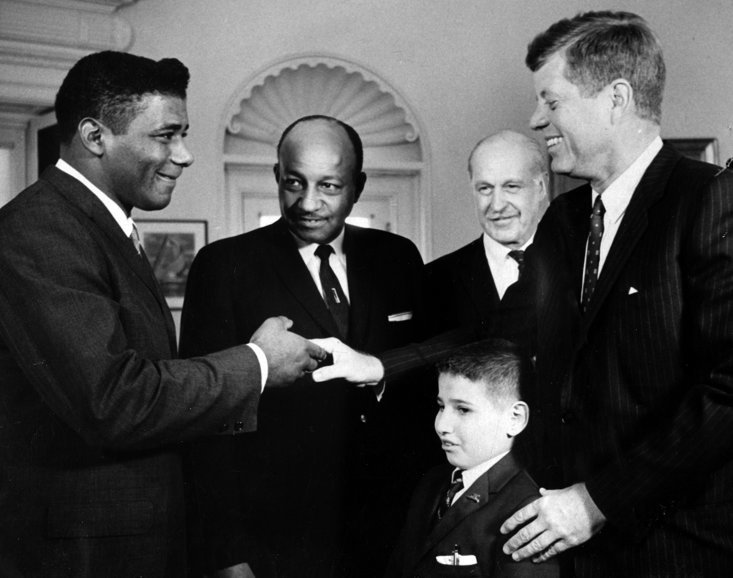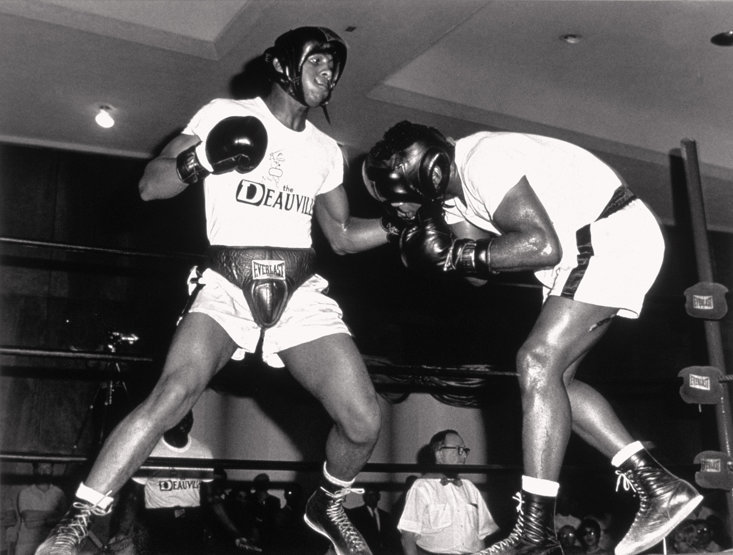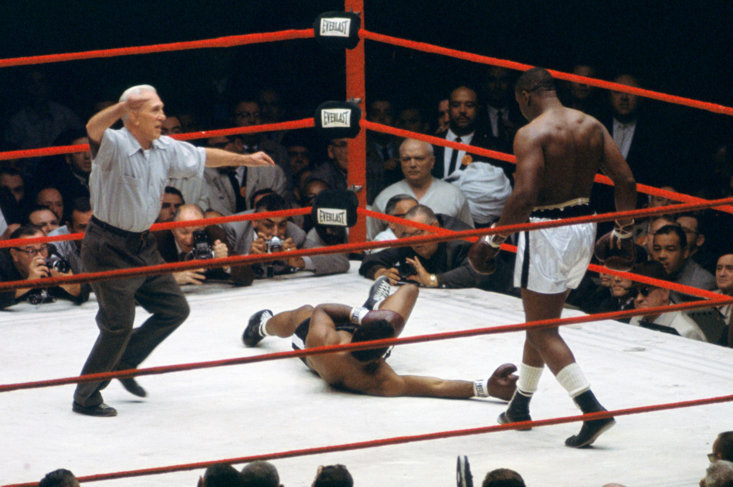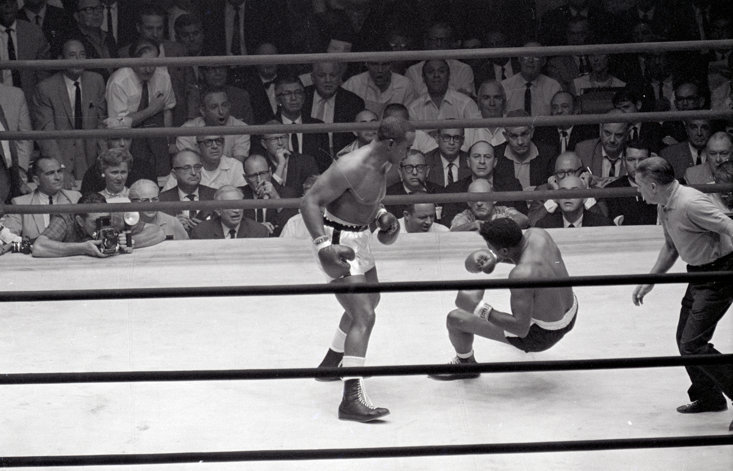History has not been kind to Floyd Patterson. Countless world champions have drifted through the annals of boxing history but none are more curious than Patterson, boxing’s invisible champion and eternal enigma. With a gentle and almost sad demeanour, Patterson’s character was perhaps the furthest thing away from that of a hardened prizefighter but boxing had been Patterson’s dream since he was in high school, and he was damn good at it too.
In 1962, Patterson was on top of the world. He was the heavyweight champion, the owner of a commendable 38-2 professional record, had picked up an Olympic gold medal for the USA as an amateur and just so happened to be President John F. Kennedy’s favourite fighter. A young heavyweight named Cassius Clay might have been making the most noise and Sonny Liston might have been the most fearsome but, for the time being, it was Patterson who was numero uno in boxing’s marquee division.
The end of Patterson’s seven-year reign was imminent though and it all began during a trip to the White House to see his most famous supporter, JFK.

“Who’s next?” the Democrat inquired. Patterson paused to think, still unsure of the task ahead of him, before suggesting to the President that he had Liston in his sights. Kennedy, whose boxing knowledge Patterson would later describe as a “pleasant revelation,” was not keen on Patterson vs Liston. In fact, neither was his brother, Attorney General Robert Kennedy, who would tell Patterson the same thing later that same day at a Washington banquet: “Avoid Liston at all costs!”
The Kennedy administration was on a crusade against organised crime at the time, something that had its hooks deep within Liston, who had a rap sheet longer than the two brother’s mob hit-list, and as such was deemed unworthy to be the heavyweight champion of the world. In Patterson’s opinion though, Liston had already repaid his debt to society and should be allowed to compete like anyone else. “Maybe if Liston wins he’ll live up to the title. He may make people look up to him,” he remarked when asked why he’d give a brute like Liston a shot.
Perhaps he should have listened to the Kennedy brothers. A win over ‘The Big Bear’ would require more from Patterson, both physically and emotionally, than any other fight he’d been involved in yet and there were other factors that meant Patterson’s attention wasn’t focused entirely on the looming showdown, pencilled in for September 25.

His autobiography Victory Over Myself had become a painstaking task to complete, his marriage was beginning to deteriorate and he claimed that he would stick to his first love, boxing, over his wife if it came to it. On top of that, his relationship with his long-time trainer Cus D’Amato, whom he’d become the youngest heavyweight champion ever with (a trick D’Amato would repeat 30 years later with Mike Tyson), was beginning to sour. All of these ingredients combined together would provide Patterson with an awful frame of mind in preparation for facing, at the time, the most fearsome heavyweight who’d ever lived.
When the two heavyweights finally faced one another in the ring at Chicago’s Comiskey Park, it took just two minutes to see just how fragile the heavyweight champion’s state of mind really was. From the opening bell, Patterson, usually a fluid mover, had inexplicably decided to root the soles of his feet to the canvas and slug it out with Liston - a huge mistake. With a minute left of the opening stanza, Liston, like a shark sensing blood, battered Patterson hopelessly against the ropes. Liston slammed a massive left hook to Patterson’s undefended head and despite vain attempts to return to his feet, the fight was over in near record time for a heavyweight title bout.
The Kennedy's biggest fear had been realised, Sonny Liston, a man well known for his ties with the mob, was heavyweight champion of the world.

If the defeat was bad news for the White House, it was entirely scarring for Patterson. By the time of the traditional post-fight press conference the next morning, Patterson was nowhere to be seen and was closer to New York than he was to Chicago. It later emerged that Patterson had, in the depths of his shame and embarrassment, exited Comiskey Park via the back door and with the help of a decoy escape vehicle and a fake beard and fake moustache, escaped the ‘Windy City’ without anybody noticing.
The disguise wasn’t just a temporary escape for Patterson, either. Such was his self doubt that within a few days of his defeat, he boarded a flight to Madrid on a whim, his faux beard and moustache combo glued on, and booked into a hotel under the pseudonym of Buster Watson. Why did he do all this? He later explained, “I have figured out that part of the reason I do the things I do, and cannot seem to conquer that one word - myself - is because I am a coward.”
He wasn’t a coward. No man or woman whoever steps into the ring is and Patterson proved his courage, albeit foolhardily, when he signed on for a rematch with Liston set for July 22, 1963 in Las Vegas. Sadly, the result of the return would be eerily similar to the first fight. Shortly before the fight began a ringside vendor jokingly shouted, “Last round, folks.” He wasn’t wrong. Patterson was knocked down three times before the bout was called to a halt - it lasted just four seconds longer than the first fight.

There was no backdoor escape from Patterson this time, promptly showing up to the post-fight conference at 11 o’clock the next morning. In the aftermath of these devastating defeats, Patterson slumped into a depression before eventually recovering, and began winning fights again. There were no more title wins but ‘The Gentleman of Boxing’ remained a legitimate contender for the majority of the Sixties.
Patterson eventually retired in 1972 after a second defeat to Muhammad Ali, bowing out with an admirable 50-8-1 (40) record. His exit, just like in the fallout to his defeats against Liston, was a very much a low-key affair. With no announcement, he quietly left the sport he loved without as much as a “goodbye”.
In 1965, two years after his second defeat to Liston, Patterson found himself ringside at Liston’s own humiliation at the hands of Cassius Clay. After the fight, Patterson made his way through the streets of Maine to Liston’s hotel to comfort the former world champion. Liston was alone, his string of tag-alongs and hangers-on long gone. Patterson had been in this same position.
“Sonny, you haven’t really lost anything,” he told Liston before taking the same right hand that had beaten him senseless and shaking it.
One of the most complex characters to ever grace the ring, Patterson was the ultimate gentleman until the end. He was inducted into the International Boxing Hall of Fame in 1991.